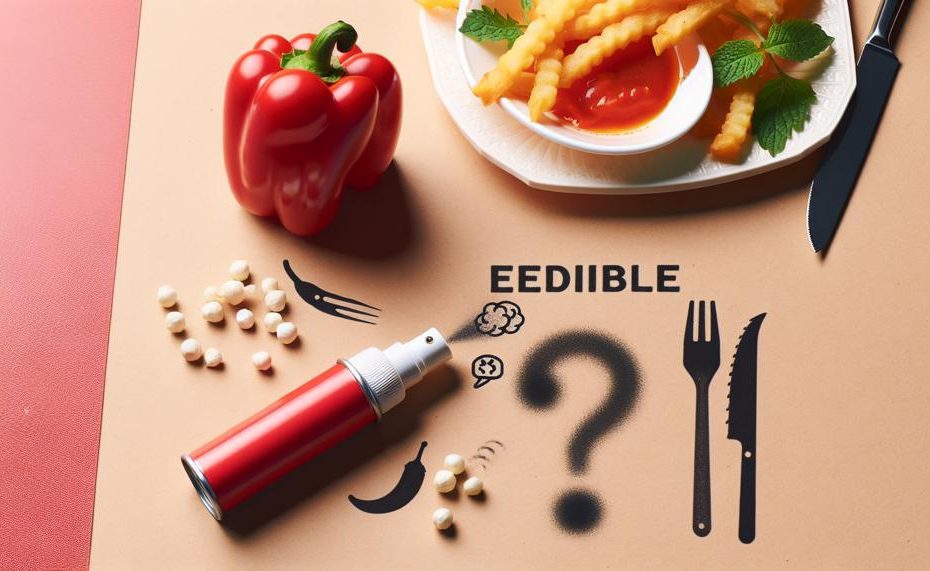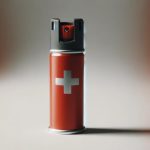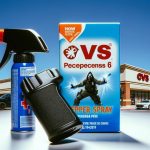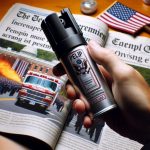Imagine this scenario: you’re out exploring the great outdoors, taking in the fresh air and beautiful scenery.
Suddenly, you encounter a bear and instinctively reach for your pepper spray. With a quick spritz, the bear is deterred and you can continue on your hike safely.
But have you ever considered whether that pepper spray in your hand is actually edible? And if it is, what could happen if you consumed it?
In this blog post, we will delve into the topic of whether pepper spray can be ingested and examine the potential consequences of doing so. Get ready to spice up your knowledge with these key points:
- Pepper spray contains capsaicin, the same compound responsible for giving chili peppers their fiery heat.
- Ingesting pepper spray can result in intense burning sensations in the mouth and throat.
- It may also cause difficulty breathing, vomiting, and temporary blindness.
- The concentration of capsaicin in pepper spray is significantly higher than that found in commonly consumed spicy foods such as hot sauce or chili peppers.
- Consuming large amounts of pepper spray can lead to serious health complications.
So, let’s start.
Contents
Understanding Pepper Spray
Pepper spray is a self-defense tool that is derived from chili pepper extract and capsaicin, a potent ingredient responsible for its intense irritation and pain-causing effects. This aerosol spray can be easily carried and used for self-protection purposes.
When sprayed on an attacker’s face, pepper spray causes immediate temporary blindness, intense burning sensations, and difficulty breathing. This allows the victim to escape from the attacker and seek assistance.
But how does pepper spray actually work as a self-defense weapon?
Pepper spray targets the attacker’s mucous membranes, specifically the eyes, nose, throat, and lungs. This results in a severe burning sensation and swelling, making it difficult for the attacker to see, breathe, or continue their assault.
The effects of pepper spray can last for at least 30 minutes, providing enough time for the victim to flee and seek help.
| Targeted Area | Effect |
| Eyes | Temporary blindness |
| Nose and Throat | Irritation and difficulty breathing |
| Lungs | Difficulty breathing and temporary choking |
The high concentration of capsaicin in pepper spray is what makes it an effective self-defense tool. It is also non-lethal, ensuring the safety of both the user and the attacker.
In addition to its effectiveness, pepper spray is also a convenient and easy-to-use self-defense weapon.
Its compact size allows it to be discreetly carried in a purse or pocket, while its quick-release mechanism enables it to be used quickly in high-stress situations.
The Components of Pepper Spray
Pepper spray is made up of various ingredients such as capsaicinoids, propylene glycol, ethanol, water, and preservatives. These substances can lead to severe discomfort and agony if ingested due to their ability to activate sensory nerve endings.
Ingesting large amounts of propylene glycol and ethanol can also result in stomach irritation and even alcohol poisoning.
Imagine accidentally consuming a small amount of pepper spray while cooking. The intense burning sensation in your mouth and throat would be unbearable, causing you to cough and cry. Now imagine drinking a large amount of pepper spray, which contains higher concentrations of propylene glycol and ethanol. This could result in severe stomach pain and potentially dangerous levels of alcohol in your body.
Is Pepper Spray Safe to Ingest?
Ingesting pepper spray can have detrimental effects on the body, as it is designed to cause extreme discomfort and pain when used as a self-defense tool.
The active ingredient, capsaicin, activates the same receptors as spicy foods but in a concentrated and intense amount.
This can lead to burning or stinging pain on the skin and, if consumed in large quantities by adults or small amounts by children, may result in nausea, vomiting, abdominal pain, and burning diarrhea.
If someone accidentally ingests pepper spray, it is recommended to immediately rinse their mouth with water and drink plenty of milk or water to dilute the effects. If symptoms persist or worsen, seek medical attention right away.
| Symptoms of Ingesting Pepper Spray | How to Treat |
| Pain and burning sensation in the mouth, throat, and stomach | Rinse mouth with water and drink plenty of milk or water |
| Nausea and vomiting | Drink plenty of water or milk, seek medical attention if symptoms persist |
| Difficulty breathing | Seek immediate medical attention |
| Temporary blindness | Rinse eyes with water, seek medical attention if symptoms persist |
| Fear and anxiety | Stay calm and seek support from a trusted individual or mental health professional |
It is also important to note that pepper spray is unsafe for consumption in any amount and should always be kept out of reach of children.
Ingesting pepper spray can also result in long-lasting effects on the body, such as damage to the digestive system and lungs.
What Happens If You Eat Pepper Spray
Consuming pepper spray can be highly hazardous and cause various possible ramifications, such as a burning sensation, stinging, discomfort, breathing difficulties, and contamination of food items.
In extreme cases, it may require medical intervention to relieve symptoms. It is crucial to handle pepper spray with care and keep it inaccessible to children.
Pepper spray is a chemical derived from the chili plant that can cause serious pain and even temporary blindness. When sprayed on someone’s face, it causes them to close their eyes, cough, and tear up. The effects can last for at least 30 minutes or more, depending on the strength and amount used.
But what happens if you eat pepper spray? Consuming pepper spray can have severe consequences. The chemicals in pepper spray can cause a burning sensation in the mouth and throat, making it difficult to breathe. It can also contaminate any food items it comes into contact with, causing further discomfort.
In more extreme cases, consuming pepper spray may require medical attention to alleviate symptoms. This is why it is crucial to use pepper spray responsibly and keep it out of reach of children. As adults, it is our duty to educate ourselves about the potential dangers of everyday items and take necessary precautions.
To avoid accidents involving pepper spray, make sure to store it in a safe place away from food items. Also, be mindful of where you are using it – make sure there are no bystanders or innocent individuals who could accidentally come into contact with the spray.
What to Do If You Accidentally Ingest Pepper Spray?
Accidentally consuming pepper spray can result in significant discomfort and potential harm.
It is crucial to understand the potential health risks and take proper precautions if such a situation occurs.
| Potential Health Risks: | Preventative Measures: |
| – Burning sensations in the mouth, throat, and digestive system | – Move to a well-ventilated area |
| – Difficulty breathing | – Flush the eyes with water for at least 15 minutes |
| – Inflammation of mucous membranes | – Avoid touching the face or contaminated clothing |
| – Vision impairment | – Seek medical attention if necessary |
| – Psychological effects such as anxiety and panic | – Use remedies such as baking soda rinses and pain relievers |
| – Always follow manufacturer’s instructions and use pepper spray responsibly | |
| – Refrain from using pepper spray indoors or in confined spaces |
Breathing in pepper spray can also lead to temporary incapacitation, making it challenging for someone to defend themselves. The effects can persist for up to 30 minutes or longer, depending on the potency and quantity of pepper spray used. Seeking medical attention is essential if symptoms persist or worsen.
Individuals with pre-existing respiratory conditions or allergies may experience more severe reactions when exposed to pepper spray. If you have a history of respiratory issues, it is best to avoid using pepper spray and opt for alternative self-defense methods.
Wearing glasses or contact lenses may offer limited protection against pepper spray, but it is not fail-safe. It is still possible for the spray to penetrate the eyes and cause discomfort. If you wear contacts, it is advisable to remove them immediately after being exposed to pepper spray.
Alternative Uses for Pepper Spray
Pepper spray is commonly known as a self-defense tool, but it can also serve as a valuable asset in various other situations. Here are some alternative uses for pepper spray that you may not have considered:
- Protection against aggressive animals: While hiking or camping, pepper spray can be used as a defense against aggressive animals, such as dogs or bears.
- Personal safety: In areas with high crime rates or during solo travels, some people choose to carry pepper spray for personal protection.
- Crowd management: In certain circumstances, law enforcement may use pepper spray to disperse unruly crowds or protect themselves from physical harm.
- Theft deterrent: To prevent thieves and burglars from entering their homes or cars, some individuals utilize pepper spray as a deterrent.
- Runner’s defense: Runners can carry pepper spray while exercising outdoors as a form of protection against potential attackers.
- Agricultural application: As a non-toxic and natural insect repellent, pepper spray can be used in gardens and on crops.
- Riot control: In extreme cases, law enforcement has used pepper spray to control riots and prevent violence.
- Animal repellent: To keep pesky animals like raccoons or skunks away from trash cans or gardens, pepper spray can be used.
- Emergency signaling: In remote areas or during outdoor activities, the bright color of pepper spray can serve as an emergency signaling device.
- Training aid: Pepper spray can be utilized in self-defense classes or law enforcement training exercises as a training tool.
There are numerous products available on the market that offer alternative uses for pepper spray, such as animal repellents specifically designed for certain animals or pepper spray with added UV dye for easier identification of attackers.
Before incorporating these products into your safety routine, it is crucial to research and understand their proper use.
Furthermore, it is essential to note that when using pepper spray, safety precautions should always be taken.
It is crucial to familiarize oneself with the product’s instructions and proper handling techniques to avoid accidents and ensure its effectiveness.
In some cases, pepper spray can cause serious harm if not used correctly, so it is essential to use it responsibly.
Conclusion
In conclusion, while pepper spray may seem like a harmless self-defense tool, it is not meant to be consumed.
The effects of ingesting pepper spray can be far from pleasant, including intense burning sensations, difficulty breathing, and temporary blindness. This is due to the high concentration of capsaicin in pepper spray, which makes it significantly more potent than your average spicy food.
Additionally, the ingredients in pepper spray can have serious health consequences if consumed in large amounts. It is crucial to use this tool responsibly and keep it out of reach of children.





